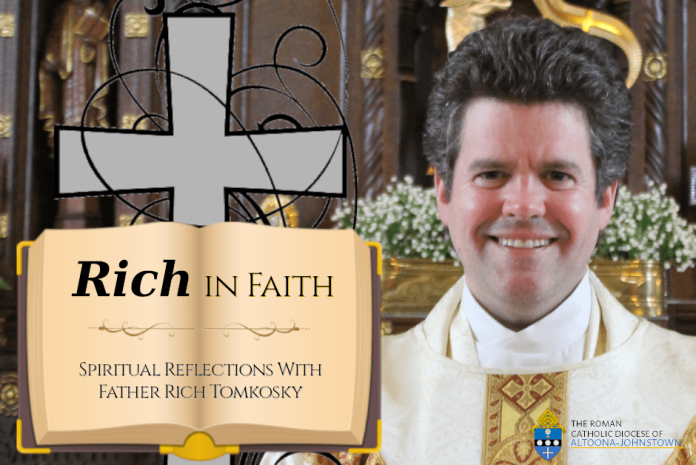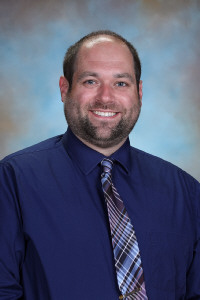By Father Rich Tomkosky
The woman suffering from hemorrhages who was healed by Jesus in the Gospel serves as a model for us human beings of how we are to seek the Lord’s healing in whatever area of our life we need it, be it physical, emotional, psychological or spiritual.
The first thing that is important to note is that God the Divine Physician often works through human agents: priests, doctors, nurses, counselors, etc. Ultimately it is God who is always the healer, and sometimes, in all honesty, the natural remedies don’t work as is noted in the passage about the woman with the hemorrhages, as it says this woman had been to doctor after doctor and had only gotten worse. Some of us have had that sad and frustrating experience. I’ve seen it with my mom. At that point the lady needed a physical miracle to recover her health and turned to Jesus who healed her because of her great faith in Him. We shouldn’t turn to Jesus as a last resort, but along with seeking natural remedies should at the same time beseech for God’s healing in our lives. In fact, that needs to be the foundation of everything we do. God in wisdom sometimes works miracles on the physical, moral, and spiritual levels of our life.
Why doesn’t God always work a miracle when we need one? Well, the saints tell us God will only work a miracle if it is for our eternal well-being. He is looking out for our salvation.
A miracle is brought about if it will help us spiritually. If it would lead to pride or complacency or presumption it won’t be brought about by our loving Lord.
The miracles we usually desire are physical healings, which do occur sometimes. But even more powerful are moral and spiritual miracles: moral miracles are when people are set free from serious habits of sin that they have been enmeshed in for years or decades, e.g., people who turn away from the homosexual lifestyle or sexual sins/addictions, or spiritual miracles in which God reveals Himself to people in a definitive way, in a moment of visitation, in which the person now comes to see in a way they never saw before the reality of God and are given the grace to put Him at the center of their life, and to make their relationship with God thru our Catholic Faith the treasure of their heart – can lead to a priestly/religious vocation.
Do we pray for these miracles in our life and for others? Do we seek out Jesus like the woman in the Gospel? Every time we receive Holy Communion, we should ask Jesus for a special grace of healing for our self or someone else. We are receiving Him into our soul a deeper reality than touch! When we go to the Sacrament of Confession, do we ask Him for a special grace of healing from some sin? Also see near death experiences and the healing dynamic of God for those souls.
What if we pray for a healing and we continue to suffer? Does God not care? He cares so much that He is forming us into the image of His Son, each day if we let Him through His grace and the power of the Holy Spirit. Mysteriously sometimes God does not take away our suffering, be it physical, emotional, psychological, or spiritual because He sees if we bear it in union with Christ, we will be purified and matured and like the branch on the vine pruned, so we can bear more spiritual fruit.
Suffering helps us to focus on the things of eternity if we look at the Crucifix and unite it with Jesus and don’t turn in on ourselves. Suffering does make or break us as human beings. God permits it because of his respect for our free will and He wants to bring a greater good from it. Suffering often is the only thing that wakes us up spiritually to the reality of God. This may be the reason why, with exceptions of course, when things are going well in our life, especially when we are young and healthy, that we tend to forget God and the things of faith.
Remember Jesus mysteriously did not take away human suffering when He died and rose for us, but He transformed it. He makes it the material of holiness if we have faith in Him and bear it in love in union with Him, for the good of our soul and offer it for the conversion of others. In relation to our neighbor, some souls are only won for God by others being willing to suffer for their conversion in love. So, while we pray for miracles in this earthly life, we need to also pray for a greater love for the Cross and for a deeper understanding of the redemptive meaning of suffering. God bless you.
Recommended Reading
On the Christian Meaning of Human Suffering. Apostolic Letter. Pope St. John Paul II. Pauline Books and Media. Boston, MA. 1994. www.pauline.org or www.vatican.va.
Father Rich Tomkosky is the Pastor of Saint Thomas the Apostle Parish in Bedford and the Pastor of Seven Dolors of the Blessed Virgin Mary Parish in Beans Cove.






























